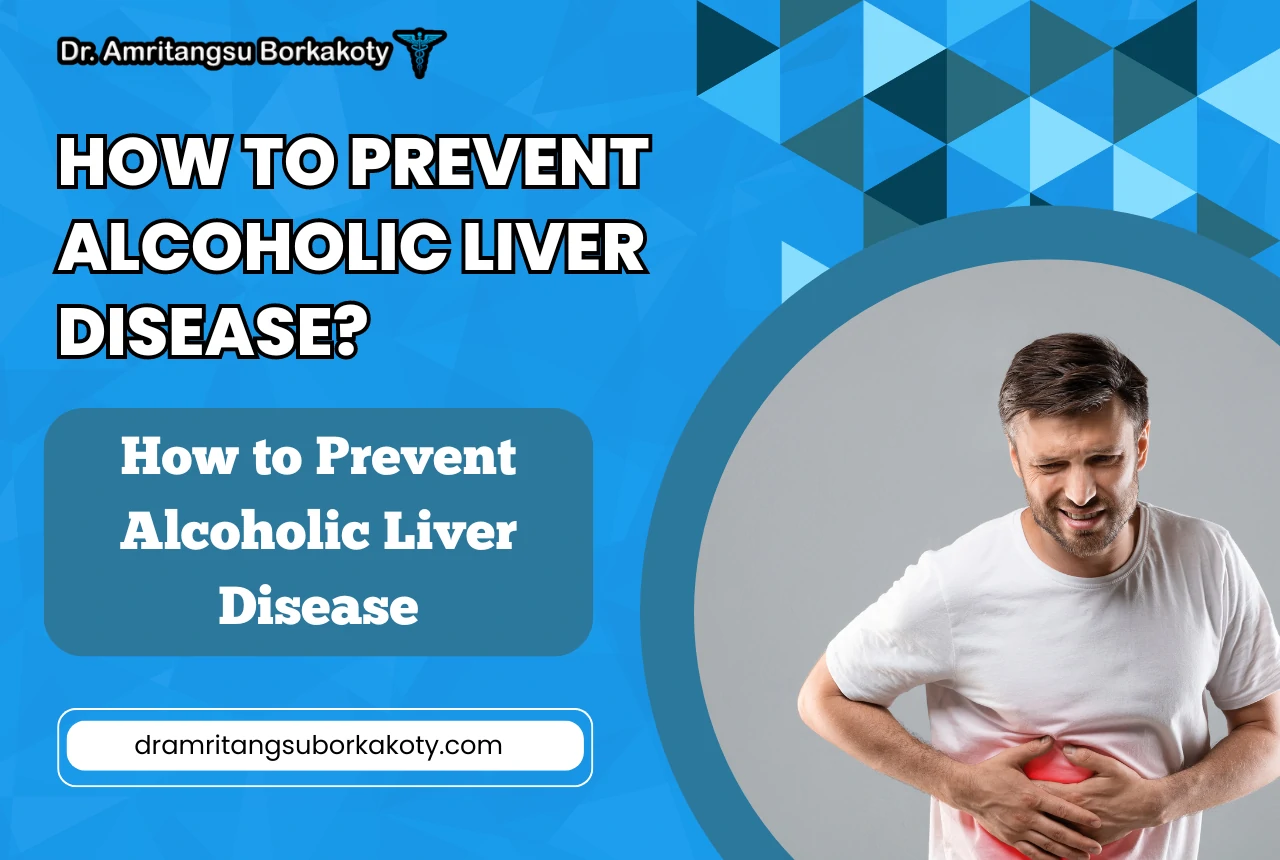
-
 Posted By Dr. Amritangsu Borkakoty
Posted By Dr. Amritangsu Borkakoty -
-
Comments 0
Let us learn how to prevent alcoholic liver disease as the liver is a vital organ responsible for numerous functions, including filtering blood, producing bile, and metabolizing nutrients. A healthy liver is essential for overall well-being. However, excessive alcohol consumption can lead to Alcoholic Liver Disease (ALD), a serious condition that can have devastating consequences.
ALD is a progressive condition that develops in stages. It begins with fatty liver, where excess fat accumulates in the liver cells. As alcohol abuse continues, fatty liver can progress to alcoholic hepatitis, an inflammatory condition that can cause liver damage. In severe cases, ALD can lead to cirrhosis, a scarring of the liver tissue that can impair its function.
The consequences of ALD are severe, including liver failure, internal bleeding, and even death. Given the high prevalence of alcohol abuse globally, it is crucial to understand the importance of prevention and adopt healthy lifestyle habits to protect the liver.
5 Effective Ways to Prevent Alcoholic Liver Disease
1. Maintain a Healthy Weight

Obesity is a major risk factor for ALD. Excess body weight can lead to the development of fatty liver disease, which is a precursor to ALD. When you eat more calories than you burn, fat builds in the liver, causing inflammation and potential injury. Maintaining a healthy weight is critical to liver health. This includes eating a well-balanced diet, exercising regularly, and controlling portion sizes. A healthy diet should include fruits, vegetables, whole grains, lean proteins, and healthy fats. Avoid consuming too many processed foods, fizzy drinks, and harmful fats.
Regular physical activity burns calories, helps you stay at a healthy weight, and improves your overall health. Aim to complete at least 150 minutes of moderate-intensity exercise per week. The Mediterranean diet, which emphasises whole grains, fruits, vegetables, olive oil, seafood, and legumes, has been demonstrated to improve liver health. According to studies, eating a Mediterranean diet may lower the risk of fatty liver disease and enhance liver function. Maintaining a healthy weight, eating a balanced diet, and exercising regularly can dramatically reduce your risk of ALD and enhance your overall well-being.
2. Embrace a Balanced Diet Rich in Nutrients

A balanced diet is vital for maintaining liver health and avoiding ALD. A balanced diet, which contains the required minerals and antioxidants, can maintain liver function and limit the risk of damage. Add a variety of fruits and vegetables to your diet. These nutrient-dense meals are high in antioxidants, vitamins, and minerals, which can help prevent liver damage. Aim for at least five servings of fruit and vegetables per day. Whole grains, including brown rice, quinoa, and whole wheat bread, are high in fibre and complex carbs. These nutrients can help control blood sugar and improve liver function.
Lean protein foods, such as poultry, fish, beans, and lentils, are required for tissue growth and repair. They also supply vital amino acids that are required for liver function. Antioxidants are essential for protecting the liver from the damaging effects of free radicals. Vitamins E, C, and B complex are very important to liver function. These vitamins can be found in a variety of foods, including fruits and vegetables, nuts and seeds, and whole grains.
It is critical to minimise the intake of items that can affect the liver. Red meat, processed foods, and fried foods include saturated and trans fats, both of which can lead to fatty liver disease. Added sugars and refined carbs, which are commonly found in sugary drinks, baked products, and processed snacks, can also harm liver health. You can promote your liver’s health and lower your risk of ALD by eating a well-balanced diet rich in nutrients and avoiding hazardous foods.
3. Prioritize Regular Exercise

Regular exercise is beneficial to general health and can greatly lower the risk of ALD. It promotes healthy weight management, improves insulin sensitivity, and enhances liver function. Physical activity can help you burn calories and keep a healthy weight. Excess weight is a risk factor for ALD, but regular exercise can help you manage your weight and put less burden on your liver.
Exercise also increases insulin sensitivity, allowing your body to efficiently use glucose for energy. Insulin resistance is a prevalent problem in people with ALD, and exercise can help improve it. Most people would benefit from at least 30 minutes of moderate-intensity exercise most days of the week. Brisk walking, swimming, cycling, and dancing are all great possibilities.
It is critical to contact with a healthcare practitioner before beginning a new fitness regimen, especially if you have any underlying health concerns. Your doctor can advise you on appropriate exercises and intensity levels based on your specific needs. Regular exercise can improve your overall health, lower your risk of ALD, and increase your quality of life.
4. Get Regular Checkups and Discuss Alcohol Consumption with Your Doctor

Regular check-ups with a healthcare practitioner are critical for maintaining your general health and discovering potential issues early on. These visits allow you to discuss your alcohol drinking patterns and express any concerns you may have. Open discussion with your doctor about your alcohol consumption is critical. They can analyse your risk of ALD and offer personalised advise on how to reduce your alcohol use or abstain entirely.
During routine visits, your doctor may prescribe blood tests to detect early signs of liver impairment. These tests can aid in detecting liver enzymes that may be high in ALD patients. Early detection and intervention are critical for preventing the progression of ALD. Addressing the condition early on can lower the chance of major consequences and improve overall liver health.
5. Seek Support if You Struggle with Alcoholism

Reducing or quitting alcohol consumption can be challenging, especially for individuals who are struggling with alcoholism. It is important to remember that you are not alone, and there are many resources available to help you overcome these challenges.
Support groups, such as Alcoholics Anonymous (AA), provide a safe and supportive environment for individuals to share their experiences and receive encouragement from others who have been in similar situations.
Therapy can also be a valuable tool for addressing the underlying issues that may contribute to alcohol abuse. A therapist can help you develop coping mechanisms, identify triggers, and develop healthy habits.
Treatment programs, including inpatient and outpatient options, offer comprehensive care for individuals struggling with alcoholism. These programs may involve detoxification, counseling, and medication management.
If you are struggling with alcoholism, it is essential to seek help. Here are some reputable resources:
- National Institute on Alcohol Abuse and Alcoholism (NIAAA): https://www.niaaa.nih.gov/
- Substance Abuse and Mental Health Services Administration (SAMHSA): https://www.samhsa.gov/
By seeking support and utilizing available resources, you can take steps towards recovery and improve your overall well-being.
Rewinding the points
To prevent ALD, a holistic approach is required, which includes minimising alcohol intake, maintaining a healthy weight, eating a balanced diet, exercising regularly, getting medical advice, and seeking help if necessary.
Adopting a healthy lifestyle and making informed alcohol intake decisions can dramatically minimise your risk of getting ALD while also protecting your liver health. Remember, it is never too late to make healthy changes and work towards a healthier future.
Recent Posts
- Common Causes of Stomach Ulcers and Effective Treatment Options
- Early Symptoms of Liver Damage: How to Spot the First Warning Signs Before It’s Too Late
- Best Treatment for Hepatitis B and C: Your Complete Guide to Symptoms, Care, and Prevention
- How to Reduce Liver Inflammation Fast: 5 Proven Tips for Rapid Liver Recovery
- Why You Shouldn’t Ignore NAFLD: 5 Shocking Health Risks You Need to Know



